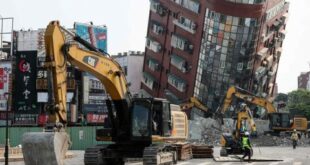The government's measures to control fossil fuel emissions are set to be released at COP28

The federal government says Canada's promised oil and gas emissions cap framework could drop any day.
Environment Minister Steven Guilbeault — now in Dubai for the 2023 United Nations Climate Change Conference, better known as COP28 — said Friday he would be "shocked if this framework wasn't presented at the end of this conference."
Prime Minister Justin Trudeau confirmed the Liberal government's plan to impose a lid on emissions from the oil and gas sector at a previous COP summit in 2021.
On Friday, Guilbeault said recent legal setbacks were among the reasons the government is taking more time to develop the framework.
"The Supreme Court decision on impact assessment and the federal court ruling on plastics… has meant that we have to make sure that it tackles pollution without infringing on provincial jurisdiction," he said.
The Supreme Court recently ruled that a federal law governing environmental impact assessments stepped into provincial jurisdiction, while a Federal Court decision struck down Environment Canada's designation of all plastic manufactured items as "toxic."
Ottawa's own emissions modelling and independent forecasts show Canada is not on track to meet its emissions reduction targets.
Since 2005, Canada has seen deep emissions cuts in the electricity sector and some modest emissions reductions in other places. Emissions from the oil and gas industry, meanwhile, have grown along with production.
The Canadian Climate Institute says its independent modelling shows that an emissions cap for the oil and gas sector is needed to achieve this country's climate targets.
A cap alone will not do the trick, one of the institute's directors, Anna Kanduth, said during a recent briefing with reporters.
But pairing a cap with strengthened methane regulations could help Canada hit its 2030 goal of reducing greenhouse gas emissions by at least 40 per cent below 2005 levels, she added.
In October, Canada pledged to accelerate its methane emission reduction plan for the oil and gas sector to achieve a cut of at least 75 per cent below 2012 levels.
"Reducing emissions from the oil and gas is critical for bringing Canada's 2030 targets within reach," Kanduth said. "And an emissions cap alongside those deeper regulations could do just that."
Before landing in Dubai, Guilbeault hinted that Canada might release strengthened methane regulations at COP28. He also said Canada is working with Washington on the file.
Methane is one of the most potent planet-warming greenhouse gases.
Eliminating methane emissions from landfills and oil and gas operations is widely seen as an easy and necessary step to limit global warming to 1.5 C above pre-industrial levels, the benchmark set by the 2015 Paris Agreement.
"Collectively, globally, if we are ambitious in our efforts to tackle methane emissions, we could shave off almost 1 C of potential warming by 2100," Guilbeault told reporters Friday.
"That's massive."
Industry supports a cap on emissions
Pathways Alliance, which represents the six largest oilsands companies, has said it does not oppose a cap on sectoral emissions.
The question, said the organization, is whether the cap will be too restrictive and limit the ability of industry to grow its production.
"We support the federal government's efforts to make significant emissions reductions by 2030, and its goal of net zero by 2050," said Mark Cameron, Pathway's vice-president of external relations. "However, getting there requires a practical and realistic approach to emissions reduction to protect jobs and investment and help provide global energy security."
The federal government's Emissions Reduction Plan calls on the oil and gas sector to cut its emissions by 42 per cent below 2019 levels by 2030.
Pathways Alliance said that target is not achievable in that timeframe and, if applied to the oilsands, would amount to an emissions cut of about 35 megatonnes without accounting for production growth.
WATCH | Oilsands industry supports oil and gas cap:

Oilsands industry supports oil and gas cap
23 days ago
Featured VideoPathways Alliance vice-president Mark Cameron says the oilsands industry supports an oil and gas cap. Chris Severson-Baker, executive director of the Pembina Institute, and the University of Calgary’s Sara Hastings-Simon speak about the need for an oil and gas cap.
The industry's view departs from that of Alberta's provincial government.
Alberta Premier Danielle Smith said Thursday her government will oppose the pending regulations.
"We have been very firm in saying that we oppose any kind of arbitrary emissions cap, whether it's on oil and gas emissions or whether it's on methane," Smith said.
The federal Conservative Party also opposes an Ottawa-imposed oil and gas emissions cap.
How the cap could affect production
Federal Energy Minister Jonathan Wilkinson is working alongside Guilbeault to develop the oil and gas cap framework and the regulations.
Last month, he said any cap Ottawa proposes would be "informed by logic" and would allow Canada to compete with other oil-producing countries.
Canada is the fourth-largest oil producer globally and the fifth-largest natural gas producer.
"We want to make sure that we do this in a thoughtful way that's rigorous, that's informed by logic and that pushes for as many (emissions) reductions as we can see in the sector as possible, without shutting in production that's not linked to global declines in demand," Wilkinson said at a recent net-zero conference.
"Because that would essentially make us poorer in Canada and make our American friends or folks in Saudi Arabia or elsewhere richer."
Oil and gas cap development update
22 days ago
Featured VideoEnvironment Minister Steven Guilbeault and Energy Minister Jonathan Wilkinson speak about the development of regulations to impose a cap on oil and gas emissions. Both ministers spoke at the third annual climate conference co-hosted with the Net-Zero Advisory Body and the Canadian Climate Institute on Nov. 9.
Guilbeault said the pending framework would offer a "plain language" version of its climate policy before the government commits to draft regulations.
The framework also will describe the enforcement mechanism Ottawa will use to ensure oil and gas producers comply, he said.
The federal government has indicated it could use a cap-and-trade system to allow companies to buy and trade a limited number of emissions allowances, or permits. The number of those permits would decline over time to reflect the emissions cap.
The government also has said it could impose a higher carbon price on oil and gas producers to ensure emissions align with the cap.
Guilbeault would not reveal a specific total emissions limit for the sector. He said the framework would indicate "the range in terms of emission reduction for the sector."
Canada's emissions reduction plan calls for emissions from the oil and gas sector to decline to 110 megatonnes in 2030. The NDP said the oil and gas cap should reflect that.
"If the government is going to choose to let the industry contribute less than what's articulated, I think they have to explain to Canadians and other sectors of our economy why they are going to be expected to do more," said Taylor Bachrach, the NDP critic for transport.
Alex Cool-Fergus, national policy manager for Climate Action Network Canada, said the cap needs to take effect soon after the framework is released.
"There's no time to lose. This cap has to be imposed on the oil and gas sector if Canada wants to have any chance of meeting our emissions targets," Cool-Fergus said.
Guilbeault said that draft regulations "will follow suit in the coming months." In comments recorded by an environmental organization at COP28, he said draft regulations would be tabled in the new year or as soon as possible.
It has been 2 years since the Prime Minister first promised to cap & cut emissions from the oil and gas industry, yet not even draft rules have been released. Today at <a href="https://twitter.com/hashtag/COP28?src=hash&ref_src=twsrc%5Etfw">#COP28</a> <a href="https://twitter.com/lev_jf?ref_src=twsrc%5Etfw">@lev_jf</a> asked <a href="https://twitter.com/s_guilbeault?ref_src=twsrc%5Etfw">@s_guilbeault</a> when these critical new rules will finally be released. Watch below for his… <a href="https://t.co/mA4OeM0VdK">pic.twitter.com/mA4OeM0VdK</a>
—@envirodefence
Clarifications
-
In a previous version of this story, Pathways Alliance, which represents the six largest oil and gas companies, said an emissions cap was necessary. In fact, the group has said it does not oppose a cap on its emissions.Dec 02, 2023 10:30 AM ET
*****
Credit belongs to : www.cbc.ca
 MaharlikaNews | Canada Leading Online Filipino Newspaper Portal The No. 1 most engaged information website for Filipino – Canadian in Canada. MaharlikaNews.com received almost a quarter a million visitors in 2020.
MaharlikaNews | Canada Leading Online Filipino Newspaper Portal The No. 1 most engaged information website for Filipino – Canadian in Canada. MaharlikaNews.com received almost a quarter a million visitors in 2020.







